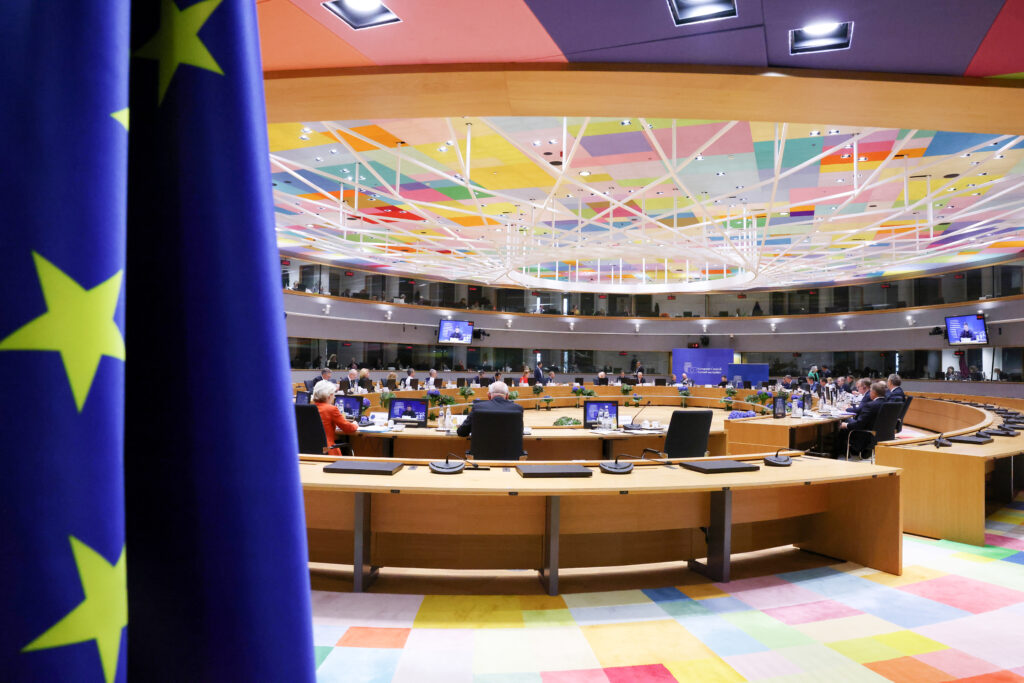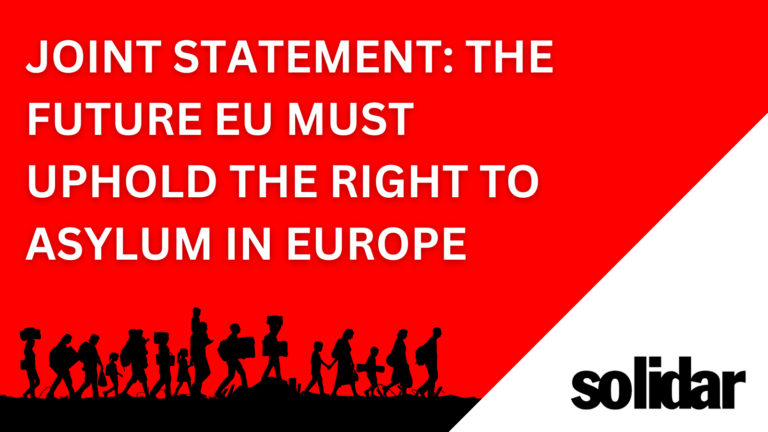EU leaders go full hardline on migration
Update from 14th November
SOLIDAR is endorsing other joint initiatives calling out the shocking proposals made by Poland to suspend the right to asylum, and the equally deplorable lack of reaction from EU leaders made worse by their even higher bids to endorse offshore detention centres and rollback on asylum rights in ‘exceptional situations’.
SOLIDAR has signed an open letter to Ursula von der Leyen urging her to take action against Tusk’s recent decision to suspend asylum for people crossing the Belarusian border into Poland and supports this letter from migrant-led organisations, calling EU leaders to change course and end their war on migrants.
The first weeks of October 2024 saw a sharp turn to the right in EU migration and asylum policy. Commission President Ursula von der Leyen’s letter to member states and the European Council’s conclusions contain various aspects that will accelerate a race to the bottom to dismantle what is left of the right to seek asylum in Europe. Nationalist and neo-fascist rhetoric and policies have been mainstreamed. If this blatant shift of migration and asylum policy away from human rights and international law is indicative of the EPP and President von der Leyen moving even further to the right in this mandate, we should all be extremely concerned.

Temporary suspension of the right to asylum
Polish Prime Minister Donald Tusk, next in line for the EU presidency, announced on 12 October the temporary suspension of the right to international protection for people crossing the border from Belarus. The reason given is the alleged ‘instrumentalisation of migrants’ as a tactic in the ‘hybrid war’ that Belarus is waging on the EU’s borders as Russia’s proxy. SOLIDAR member Migration Consortium pointed out that this measure would directly violate the Geneva Convention and the EU Charter of Fundamental Rights. For this, the Polish Prime Minister wanted the support of EU leaders. He left the European Council successfully, with everything but a formal stamp of approval from his peers as an ‘expression of solidarity with Poland and with member states facing these challenges’. Tusk’s success heralds dangerous times for the right to asylum in the EU, going beyond the EU Pact on Migration, which at least formally guarantees access to a fair asylum procedure. This new proposal would make it almost impossible for certain groups to apply for asylum in Poland.
A common approach for ‘speedy returns’ and return hubs
The Commission President refers to ‘return hubs’ outside the EU as an innovative way to counter illegal migration, and to support a new legislation on returns. Several Member States have also publicly supported the development of agreements along the lines of the Italy-Albania protocol. The Commission President indirectly did the same saying that the EU will ‘be able to draw lessons from this experience in practice’, whereas several human rights organisations’ have signaled serious concerns on the respect of human rights in such a policy. It is quite frankly appalling that the Commission President is openly in favour of setting up detention centres outside the EU. This would further contribute to the externalisation of the protection process and weaken the right to asylum in the EU.
A ‘whole of route’ approach amounts to the EU evading its responsibilities
This does not bother President von der Leyen and some Member States who refer to the essential role of partnerships with third countries in reducing irregular arrivals. his does not bother President von der Leyen and some member states, who point to the essential role of partnerships with third countries in reducing irregular arrivals. So far, such agreements have been signed with Turkey, Libya, Tunisia, Morocco, Egypt and Mauritania, and talks are underway with Senegal and Mali. Instruments such as the visa and trade policies would also be used as leverage to get third countries to cooperate on readmission and returns. These partnerships are part of a wider trend of Europe abdicating its responsibility to respond to global protection needs. Europe’s externalisation of asylum processing or refugee protection has been shown to result in breaches of international legal obligations, disregard for human rights and detrimental consequences for the physical and mental well-being of people seeking protection. In addition, these costly deals divert much-needed money from Europe’s existing protection systems. It is also absurd to pretend that third countries with poor human rights records will suddenly respect fundamental rights in the context of migration management – why should they? Violations of fundamental rights in Tunisia since the signing of the EU-Tunisia Memorandum of Understanding have been brought to the EU’s attention. Not even EU member states themselves are fully enforcing fundamental rights, with little or no accountability. Such deals highlight the hypocrisy of the EU.
In all of this, it is very telling that the Pact on Migration and Asylum is essentially absent from the European Council conclusions. This is the same Pact that was adopted earlier this year, supposedly to fix all the flaws and gaps in the EU migration system. And it speaks volumes that the new Commissioner for Internal Affairs and Migration, Magnus Brunner, comes from a hardline right-wing Austrian party. It illustrates well the sharp right turn that the European Commission intends to take on migration, and possibly what we can expect from the coming mandate on a range of issues.



